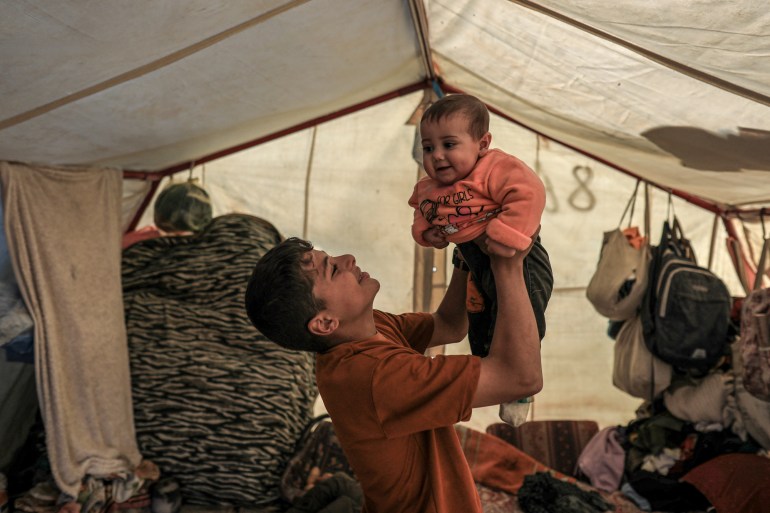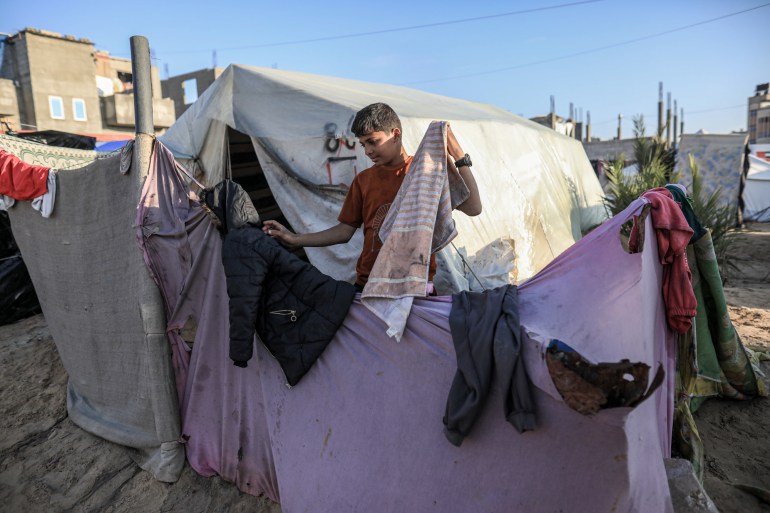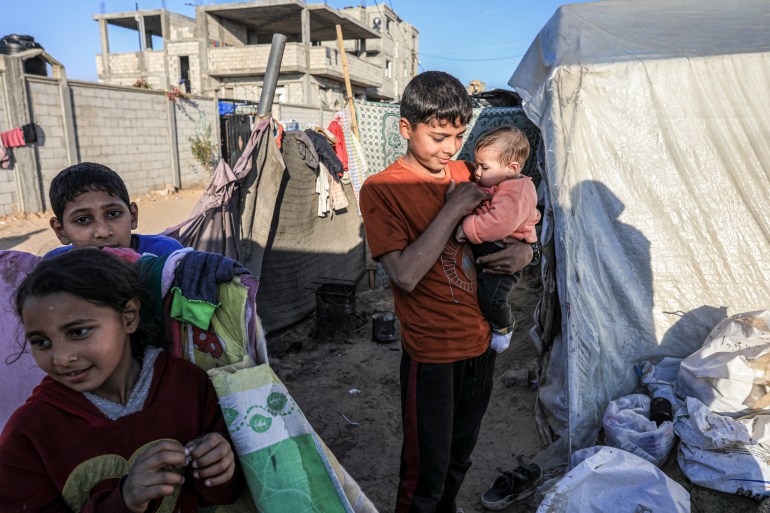
[ad_1]
Deir el-Balah/Rafah, Gaza – In a little tent in Rafah, 15-year-old Nagham al-Yaziji and her brother Mohammad, 14, are holding down the fort as best they can, keeping house and caring for their seven younger siblings, the youngest of whom is six-month-old sister Toleen.
The children have lost both their parents over the past four months and had to bring their younger siblings south on their own, set up a tent, and struggle through every day as best they can.
Holding Toleen in his arms and bouncing her gently, Mohammad tells Al Jazeera about the day they lost their mother, Shouq al-Yazji, 37, in the first week of Israel’s war on Gaza.

“That day, my mother asked us to look after my little sister, Toleen, who was three months old at the time, because she was going to visit my grandfather nearby,” Mohammad recalls.
While Shouq was visiting her elderly parents, the house next door was bombed, killing everyone in it and in the surrounding houses. Her husband and children found out late that evening.
“Hearing that was devastating,” Nagham says, describing the feelings of sadness and utter loss they all felt when they realised they would never see their mother again.
Left alone
After Shouq was killed, the family struggled without her as their fears built up with the worsening safety situation in their neighbourhood.

Seeking safety in numbers, their father took everyone to al-Shifa Hospital for shelter. But conditions there were terrible, with overcrowding and a severe lack of everything, even access to hygiene.
So the decision was taken that they would flee further south, and the children’s father started to prepare for the trip.
“My father left us that day to go to our house and get a few things we would need. But he never came back,” Nagham says. “We lost contact with him, and we don’t know his fate.”
In the midst of the confusion and worry over their disappeared father, the older children were painfully aware that the situation was only getting worse and that something would have to be done to protect the younger ones.

“So, we fled to the south with my uncle,” Nagham says.
Their uncle does not live with them. All he could do was help them set their tent up and look in on them from time to time.
For the day-to-day, the older children take care of the younger ones and somehow the nine make do.
“I queue for water and aid and bread every morning. I start a wood fire and heat up the water to prepare formula for my baby sister,” Mohammad says proudly.
Nagham, as the eldest, frets about her siblings daily. “Life without a father and mother would be excruciating in normal circumstances, let alone such dire circumstances,” Nagham adds.
Mohammad, in spite of his young age, tries as hard as he can to do the things that his father would have been doing for the family, and it seems to pain him that the little makeshift tent where they all shelter lacks even the simplest and most basic of necessities.

“Sometimes I’ll go out looking for a day’s work when we have nothing to eat and I need to earn to support my siblings.
“But some of those times I come back without any money and they go to bed hungry,” Mohammad says.
Nagham, for her part, takes on the mothering, trying to take care of the entire family, especially 18-month-old Youssef and baby Toleen.
“I make them their bottles with Mohammad’s help. I change their diapers and figure out what our meals will be every day.
“Yesterday I managed to make falafel for them, with the help of my aunt,” Nagham says.

While she does her best with her circumstances, Nagham is still a child herself and struggles with fear, doubt and sadness.
“I don’t understand everything children want. Sometimes, my baby sister will wake up in the middle of the night crying but I won’t understand what she wants.
“I don’t know: Is she hungry? Is she in pain? I often end up crying along with her,” Nagham says tearfully.
While both Mohammad and Nagham hope day in and day out that the war ends soon and that they can find out what happened to their father, they also live in constant terror of the Israeli raids and the land assault Israel is threatening to launch.
“This situation is so terrifying. We’re afraid when they bomb at night. I try to reassure my siblings and calm their fears, but the whole time I’m trembling myself,” Mohammad says.
“We don’t know where we would go anymore,” Nagham interjects. “It’s not like there’s anywhere safe that we can take the little ones and go, so we just stay here with our fears.”
“I miss my parents terribly. Life without them is so unbearably hard and sad,” Mohammad concludes.

[ad_2]
Source link
